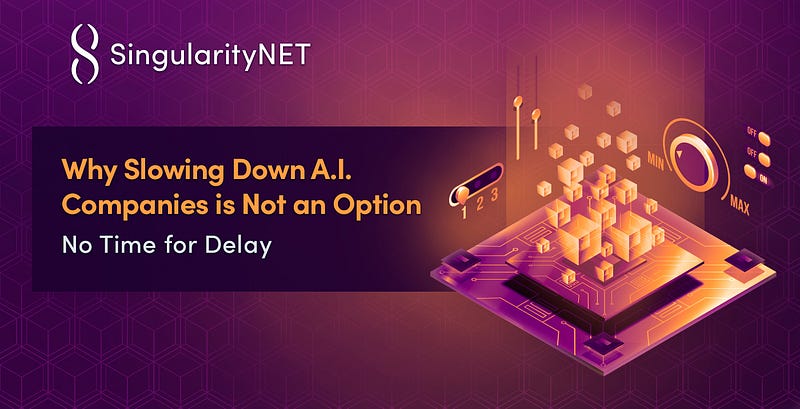
Dear Singularitarians,
The debate over artificial general intelligence (AGI) and its imminent arrival is heating up, with some advocating for a cautious approach to development while others a tribe known as the e/acc (effective accelerationists) are promoting its rapid advancement as an ultimately beneficial innovation that will help humanity solve some of its most pressing problems.
Regardless of which side of the spectrum you find yourself on, this begs the question: with so many parties and different interests involved in the research, development, and ultimately, the deployment of AGI, is slowing down AI companies even a viable option at this point in human history?
In a recent conversation with Brian Rose on the London Real podcast, Dr. Ben Goertzel explains what makes slowing AI development a risky scenario, highlighting the realities of technological competition, economic forces, and the potential benefits of advanced AI.
Watch the full interview here:
Many industries rely on AI, AI-powered solutions, and AI-driven innovations.
One example is healthcare, where AI is revolutionizing the way diagnoses are made, treatments are personalized, and operational efficiencies are achieved. For instance, machine learning models analyze extensive medical data to uncover patterns that may elude human experts. This leads to earlier and more accurate detection of diseases such as cancer or heart conditions.
AI-enabled robotics are also transforming surgeries, enhancing precision while minimizing recovery times. Slowing down AI development means slowing down healthcare, it could result in delays in these vital advancements, negatively affecting patient outcomes and the overall efficacy of healthcare systems.
But slowing down AI companies would not just hinder specific technological advancements it could put entire countries or regions at a competitive disadvantage globally.
As mentioned in Dr. Ben Goertzels discussion with Brian Rose, while some advocate for a more cautious approach to AI, the relentless progress made by specific companies or even countries makes this stance challenging.
These countries and vested parties are not pausing their advancements, thereby putting pressure on others to keep pace or risk falling behind.
This creates a scenario where slowing down could leave a country or company at a competitive disadvantage, diminishing their influence and economic opportunities.
The involvement of both for-profit and nonprofit entities in AI also underscores a complex landscape where financial incentives play an important role. This economic drive pushes companies to accelerate development, further fueled by the competitive landscape where being first or fastest can translate into significant market advantages.
The organizational structure of OpenAI is another critical aspect of this story. Originally set up as a hybrid of a nonprofit and a for-profit entity, this structure could not have been more unusual and problematic. In most setups, nonprofits aim to serve broader societal goals, while for-profits focus on generating revenue. OpenAIs approach led to inherent tensions, especially as the profit-driven side sought financial gains that might contradict the nonprofits mission. This tension reflects broader challenges in corporate governance, where aligning divergent interests is both very important and just as complex.
Some key figures in the AI community promote an optimistic view of accelerationism, where faster development of AI could lead to significant benefits for humanity. They believe that the risks of accelerating AI are outweighed by the potential benefits, especially when considering the other global challenges that are not slowing down.
While some accelerationists argue for centralization, with large corporations leading the way, others choose to support a more decentralized model to prevent monopolistic control and ensure that the benefits of AI are accessible to all sentient beings. This discussion is not just theoretical, either it has practical implications for how AI is ultimately developed (and deployed) globally.
This isnt just a question about technological innovation its one about the philosophical, ethical, and organizational challenges that come with it.
Whether youre an e/acc or a decel is a vivid illustration of how vision, values, and structure can influence the path and impact groundbreaking technologies.
The momentum behind AI development, driven by economic, competitive, and technological factors, makes deceleration a less appealing strategy for key stakeholders and leaders in the field.
The complexities of this landscape, as evidenced by corporate governance quirks and the global race for technological supremacy, highlight the need for a balanced (yet forward-moving) approach.
We as a humanity need to ensure ethical practices, development safety measures, and that the benefits of AI are accessible to all. With that said, the overall trajectory of AI development suggests that acceleration, rather than deceleration, is the path most likely to yield positive outcomes for humanity.
SingularityNET is a decentralized Platform and Marketplace for Artificial Intelligence (AI) services founded by Dr. Ben Goertzel with the mission of creating a decentralized, democratic, inclusive, and beneficial Artificial General Intelligence (AGI).